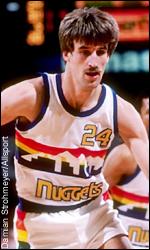



|

|
Tuesday, September 19
No harm, no foul for Hanzlik
By Wayne Drehs
ESPN.com
Accuse Bill Hanzlik of having a honed-in case of tunnel vision in 1980.
Smack in the middle of his senior season at Notre Dame, with the impending NBA Draft on the horizon, Hanzlik barely took notice when call of the Olympic boycott came down. Even a few months later, when Hanzlik played his way onto the Olympic team and the boycott directly affected him, he wasn't nearly as distraught as some of his fellow Olympians.
"At the time, you almost in a sense don't really realize it because you are so involved in school and your team at school," Hanzlik said. "You've got graduation on the mind, this and that, you're looking forward to the draft, it's just a different cycle than a normal athlete who dictated their whole life around making the Olympics. Now that I look back I think, ?God, it would have been amazing to go,' just unbelievable, but I was so caught up in other things I didn't even realize it."
Hanzlik, along with future NBA standouts Mark Aguirre, Rolando Blackman, Sam Bowie, Isiah Thomas and Buck Williams would have formed the youngest team in the history of men's Olympic basketball. Instead, the team coached by Dave Gavitt toured the U.S., playing six contests against teams of NBA stars. They lost only once.
"We were sort of like the Globetrotters or something," Hanzlik said. "None of us were real disappointed because to us, playing in the NBA was the absolute top. Everybody knew that. You felt bad for some of the other athletes because this was the epitome of sports to them. You feel for the gymnastics people, the volleyball people, all those who this was their one shot. And it was wrong that they didn't have a voice in that decision."
Some of the marquee college seniors in 1980, such as Kevin McHale, didn't tryout for the U.S. team due to the boycott. Still, Gavitt was confident with the group of kids he put together, especially after seeing their performance against the NBA All-Stars.
|  | | Hanzlik went on to play for the Denver Nuggets, among other teams. |
"I think we would have won the gold," he said after the boycott was finalized. "I don't know if I could have said that if we hadn't played, but we won five of six against the best players in the world who I think played hard against us. If we had been going, we still had four weeks to get ready after that, which would have only made us better. So yes, I think we would have won."
Looking back, Hanzlik isn't quite as confident.
"I would have given us a shot," Hanzlik said. "But the Russian teams were so strong, the Yugoslavian teams were strong, and they were at a different competition level. These are guys that were 25-35 years old, more experienced, knew the international rules and had played together for a long time. It would have been tough to compete at that level because we were a bunch of college kids thrown together for 10 days. But, I would have given us a shot."
Later that summer, when many crushed Olympians were trying to regroup, Hanzlik's career began. He was a first-round pick of the Seattle Supersonics (20th overall), where he would play two seasons before being traded to the Denver Nuggets. There, he was a fan favorite, notorious for his pesky defense and ability to play all five positions. At 6-7, he often drew memorable defensive assignments against much larger players such as Kareem Abdul-Jabbar, Ralph Sampson and Patrick Ewing.
Injuries forced him to retire after the 1990 Playoffs, and in 1997, he returned to Denver as head coach. There he struggled, leading the Nuggets to an 11-71 record, including a 23-game losing streak. After one season, Hanzlik was fired.
Today, Hanzlik still lives in Denver, where he runs the non-profit Gold Crown Foundation, which operates year-round sports programs for area youths. He said the camps reach about 20,000 kids and this year will include coaching seminars taught by the Notre Dame Sports and Culture Department.
Over time, Hanzlik has had the ability to look back at the boycott and analyze the events he paid little attention to in 1980. His opinion has become a strong one.
"Now I realize everything, to be a pawn in a political game, not it's not right, I don't support it at all," Hanzlik said. "The idea of the Olympics is to go there and compete and try to keep the political environment separate. It was wrong."
Wayne Drehs is a staff writer for ESPN.com.
|  | |
|







